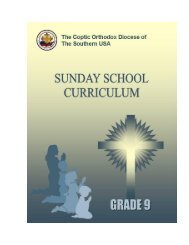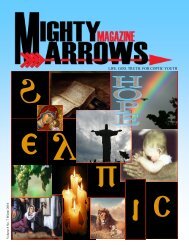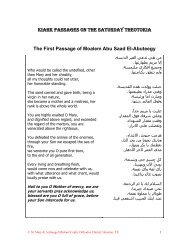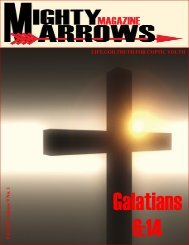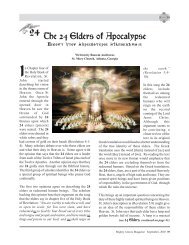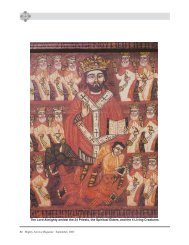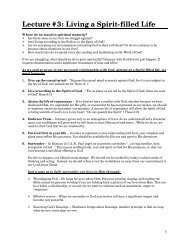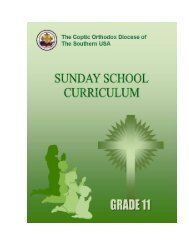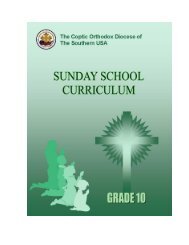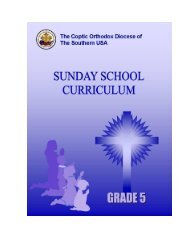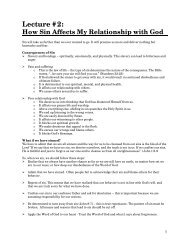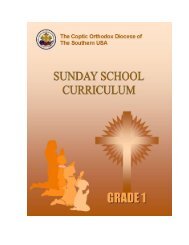Grade 12 - Coptic Orthodox Diocese of the Southern United States
Grade 12 - Coptic Orthodox Diocese of the Southern United States
Grade 12 - Coptic Orthodox Diocese of the Southern United States
You also want an ePaper? Increase the reach of your titles
YUMPU automatically turns print PDFs into web optimized ePapers that Google loves.
Sunday School Curriculum <strong>Grade</strong> <strong>12</strong><br />
is, what we once held dear is no longer considered to be so precious. The book <strong>of</strong> Ecclesiastes clearly<br />
provides expression for such a realization. It is concerned more with <strong>the</strong> fact that everything outside<br />
God consists <strong>of</strong> non-existence. God is absolute virtue, and <strong>the</strong> evil not belonging to Him consists <strong>of</strong><br />
non-existence or <strong>the</strong> deprivation <strong>of</strong> goodness. It exists ins<strong>of</strong>ar as we freely chose to separate<br />
ourselves from this good (God). Bishop Gregory employs <strong>the</strong> vivid expression <strong>of</strong> ―sewing‖ ourselves<br />
onto God which works against <strong>the</strong> ―rending‖ tendency <strong>of</strong> sin.<br />
The bishop <strong>of</strong> Nyssa in his commentary upon Ecclesiastes‘ words, ―A time to keep silence,‖ says<br />
that our human intelligence must remain in silent awe and adoration at <strong>the</strong> mystery <strong>of</strong> God‘s<br />
transcendence.<br />
The positive teachings <strong>of</strong> <strong>the</strong> book include that one should enjoy eating, drinking, and working for<br />
<strong>the</strong>se activities are <strong>the</strong> simple pleasures and bases <strong>of</strong> human life, and although wisdom could not<br />
supply all <strong>the</strong> answers, <strong>the</strong> author continued to search for wisdom, where wisdom and fearing God<br />
was still <strong>the</strong> best way to approach life.<br />
Conclusion:<br />
Ecclesiastes is a captivating book, commanding great interest. It speaks to <strong>the</strong> modern age, as <strong>the</strong><br />
climate out <strong>of</strong> which it grew is present with us today, so much that it has been called <strong>the</strong> most modern<br />
book <strong>of</strong> <strong>the</strong> bible. The questions, which <strong>the</strong> book raises, are <strong>the</strong> very questions we are raising. They<br />
are questions about meaning (1:3), monotony (1:10), destiny (3:21), justice (6:8), and <strong>the</strong> future (8:7).<br />
The author chose to view <strong>the</strong> world from a natural perspective (―under <strong>the</strong> sun‖), to meet his<br />
audience on its own ground – in order to show <strong>the</strong>m <strong>the</strong> utter futility <strong>of</strong> a soulless and Godless world.<br />
Modern man is also a man <strong>of</strong> sight, his conclusion about life being based upon what he can see<br />
with his own eyes! But he has become so dependent upon his eyes that he is trapped. He can only<br />
perceive that which is seen. Failing to see God and to detect his purposes, modern man becomes<br />
weary and even lost, concurring with Ecclesiastes‘ finding -- all is vanity.<br />
<strong>12</strong>6 THE GREAT FAST



